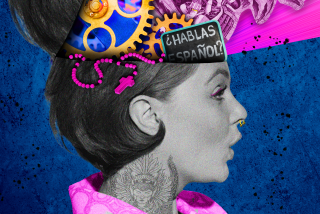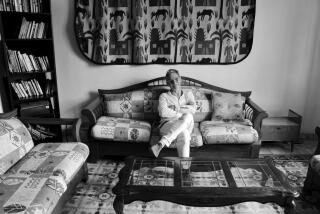1990 BOOK PRIZE WINNER: HISTORY : On Richard Fletcher’s ‘The Quest for El Cid’
- Share via
As anyone who has ever taken a course in medieval Spanish history can attest, the subject is nightmarishly complicated. When Rodrigo Diaz, who would later be known as El Cid, was born around 1043, the southern two-thirds of the Iberian peninsula, Al-Andalus, was still under Muslim rule, but the formerly unified caliphate of Cordova had broken down into a score of tiny city-states known as taifas.
The northern, Christian portion of the peninsula was divided into the rival kingdoms of Castile-Leon, Navarre, Aragon, and the county of Barcelona. Frontiers constantly shifted as the various petty rulers formed alliances that often cut across religious lines in their relentless efforts to conquer and exploit their neighbors.
Although by the year 1000 the population of Spain is thought to have been 75% Muslim, Christians lived and practiced their religion throughout Al-Andalus, while many Muslims lived in Christian territory, and there were important Jewish settlements throughout the peninsula. Large sectors of the population were bilingual or even trilingual, and intermarriage and conversion from one religion to another were commonplace.
The great virtue of Fletcher’s “The Quest for El Cid” is that he manages to bring some order out of all that chaos and to tell the story of those long ago, turbulent times in a way that is both comprehensible and fascinating to the modern reader. The title, which strikingly parallels Schweitzer’s “The Quest of the Historical Jesus,” is somewhat misleading. Fletcher’s stated purpose is to strip away the layers of myth and legend that somehow transformed a rather opportunistic mercenary warlord who fought for both Muslims and Christians into Spain’s national hero, “the crusading warrior who waged wars of re-conquest for the triumph of the Cross over the Crescent and the liberation of the fatherland from the Moors.”
In fact, though there may be a few laymen who still cherish the heroic image of El Cid portrayed in late 19th- and early 20th-century children’s books and in the 1961 Charlton Heston film, the true facts of Rodrigo Diaz’s career have been well known since at least 1849, when Reinhardt Dozy published his iconoclastic “ Recherches sur L ‘ histoire et la litterature de l’Espagne pendant le moyen age. “ Fletcher contributes no new material that significantly alters Dozy’s conclusions.
Fletcher is a sophisticated historian who knows how to read his sources--both medieval and modern--critically, probing beneath the surface for the biases that led earlier historians to emphasize certain events while ignoring others. For example, he astutely points out that Evariste Levi-Provencal, as a Parisian, “was culturally attuned to centralism and regarded the provinces as shabby and distasteful.”
Hence, his account of 10th-Century Islamic Spain needs to be balanced by a more thorough study of events in the provinces. Fletcher obviously does not believe in the possibility of truly objective history. All historical narratives, he insists, are filtered through the minds of historians whose writing is inevitably colored by their own conscious or unconscious prejudices. That of course raises the question: what hidden agenda was Fletcher promoting in writing this book?
The answer lurks between the lines of almost every page of this book. Fletcher is a proponent of global culture, the notion that men and women all over the world are basically alike, and that the concept of uniquely national cultures is a dangerous and outdated idea. He loathes Ramon Menendez-Pidal’s “La Espana del Cid” precisely because it is, in Azorin’s words, “a wonderful lesson in patriotism.” The fact that Franco exploited Menendez-Pidal’s portrayal of the Cid as the embodiment of the unique and admirable qualities of the Castilian spirit makes that image all the more odious and deserving of deflation.
Fletcher cannot avoid the fact that the Spanish people have been notoriously resistant to the imposition of a central political authority, but he argues that “this is not owning to any stubborn streak of cussedness or pride in the Spanish character. It arises simply from the size and physical conformation of the Peninsula.” The fact is that other, larger nations divided by more formidable physical barriers have in fact developed a very strong sense of national unity. As the tourist posters used to remind us, “Spain is different,” and it is different in much the same ways that the Muslim world is different.
Fletcher argues that the Poema largely responsible for creating the myth of the Cid was written during the turbulent reign of Alfonso VIII, when the kingdom was imperiled by “those who put sectional interest before the common good, who neglected their Christian patriotism and forgot their duties to the king. The poet reminded his compatriots of where their responsibilities lay.” If that were true, why would the poet have portrayed Alfonso VI in such a negative manner? Why the famous refrain, which Spaniards have had reason to repeat all too often in their later history: “God, what a good vassal, if only he had a good lord!” Fletcher quotes Dozy’s description of the Cid as “more Muslim than Catholic”--a statement which has far-reaching implications, but which he does not choose to pursue.
The uniqueness of Spanish culture derives from the coexistence during seven centuries of Christians, Muslims, and Jews--unlike anything that occurred anywhere else in Europe. Fletcher argues that “the most striking feature about (Spanish) Christendom’s reaction to Islam was incomprehension. At least, that is what we would call it today.
Early medieval Christians would have been scandalized to have their reactions characterized in this manner, but we live today in an atmosphere of religious pluralism.” It is hard to imagine any other time or place history more characterized by religious pluralism than medieval Spain. The tragedy is that that rich pluralism was ultimately destroyed. Perhaps the most important lesson we can learn from medieval Spanish history is not that cultural differences are illusory or unimportant, as Fletcher seems to suggest, but rather that there is much of value to be gained from a unity founded on respect for diversity.
Nominees In History
AWASH IN A SEA OF FAITH; Christianizing the American People by Jon Butler (Harvard University Press)
ITALY AND ITS MONARCHY by Denis Mack Smith (Yale University Press)
A PEACE TO END ALL PEACE; Creating the Modern Middle East, 1914-1922 by David Fromkin (Henry Holt)
THE QUEST FOR EL CID by Richard Fletcher (Alfred A. Knopf)
THE SEARCH FOR MODERN CHINA by Jonathan D. Spence (W.W. Norton)
More to Read
Sign up for our Book Club newsletter
Get the latest news, events and more from the Los Angeles Times Book Club, and help us get L.A. reading and talking.
You may occasionally receive promotional content from the Los Angeles Times.







